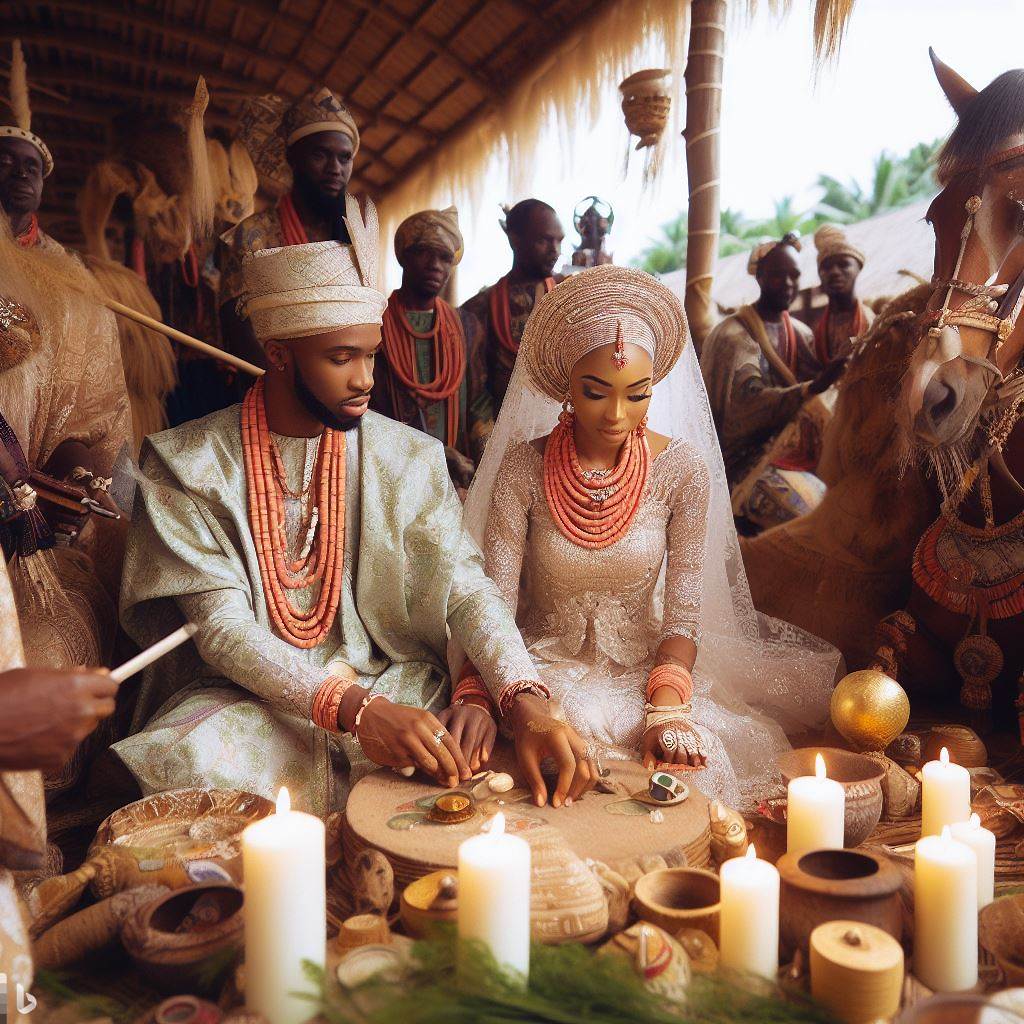Introduction
Past traumas in a Nigerian marriage refer to any emotional or physical pain experienced in the past.
Addressing and overcoming these traumas is essential for a healthy and successful relationship.
It is common for individuals in Nigerian marriages to carry emotional baggage from past experiences.
Unresolved traumas can negatively impact trust, communication, and overall marital satisfaction.
By acknowledging and confronting past traumas, couples can create a safe and supportive environment.
Overcoming past traumas requires open communication, empathy, and professional support if needed.
Healing from past traumas can enhance emotional intimacy and strengthen the bond between partners.
Addressing these traumas allows couples to break free from destructive patterns and create positive change.
Individual and couples therapy can provide helpful tools to heal and grow from past traumas.
It is important for both partners to actively participate in the healing process and support one another.
By overcoming past traumas, Nigerian couples can build a foundation of trust, love, and happiness.
Types of past traumas in Nigerian marriages
When it comes to Nigerian marriages, there are various types of past traumas that couples may encounter.
These traumas can deeply affect the relationship, causing distress and hindering personal growth.
It is essential to identify and address these traumas to overcome them and build a healthy, thriving marriage.
Emotional traumas
One of the most common types of past traumas in Nigerian marriages is emotional trauma.
This can encompass a range of experiences, such as infidelity, betrayal, and abuse.
These actions can cause deep emotional wounds, leading to trust issues and difficulties in building a strong foundation for the marriage.
Cultural and societal pressures
Nigerian marriages are often influenced by cultural and societal norms, which can place immense pressure on couples.
Gender roles and expectations can create conflicts and dissonance, making it challenging to establish a balanced and equal partnership.
Overcoming these traumas requires open conversations and a willingness to challenge societal norms.
Family and financial difficulties
Family and financial difficulties can significantly impact a Nigerian marriage.
Conflicts with in-laws, disagreements over financial responsibilities, or facing economic challenges can strain the relationship.
Seeking support from each other, setting boundaries, and finding practical solutions are crucial steps toward overcoming these traumas.
Infertility or pregnancy loss
The inability to conceive or experiencing pregnancy loss can be devastating for couples.
Nigerian societies often place a high value on having children, which can intensify the emotional trauma.
Seeking professional help, joining support groups, and focusing on alternative paths to parenthood can aid in healing and moving forward.
Communication breakdowns and unresolved conflicts
Poor communication and unresolved conflicts can create lingering traumas within a Nigerian marriage.
The inability to express feelings, listen actively, or find common ground can lead to a breakdown in the relationship.
Open and honest communication, along with professional counseling, can help address these traumas and foster effective conflict resolution.
Overcoming past traumas in a Nigerian marriage requires dedication, patience, and a willingness to confront difficult emotions.
By acknowledging these traumas and working together as a couple, it is possible to heal, rebuild trust, and create a loving and fulfilling partnership.
Read: Including Children in Your Nigerian Marriage Agreement
Effects of past traumas on a Nigerian marriage
- Past traumas in Nigerian marriages inflict emotional and psychological distress on both partners, harming mental well-being.
- Traumas lead to communication and trust issues, hampering intimacy and effective communication.
- Intimacy and sexual problems may surface, causing dissatisfaction and strain.
- Mental and physical health deteriorates due to unaddressed past traumas, resulting in stress and anxiety.
- Relationships with extended family members become strained.
- If not addressed, past traumas can lead to divorce.
Dealing with past traumas requires a proactive approach:
- Both partners must acknowledge the trauma’s impact and communicate openly about their experiences.
- Seeking professional help from therapists or counselors is beneficial.
- Create a supportive environment within the marriage to express emotions and foster understanding.
- Rebuilding trust demands time, patience, and consistent communication.
- Prioritize intimacy and work together to address sexual problems caused by past traumas.
- Engage in activities promoting mental and physical well-being.
- Openly discuss strained relationships with extended family members and set healthy boundaries.
- Failing to address past traumas risks the marriage’s potential breakup or divorce.
Both partners must recognize the importance of seeking support and working towards healing.
Overcoming past traumas together can strengthen the Nigerian marriage.
Read: Disputing a Marriage Contract in Nigeria: Steps to Take
Strategies for Overcoming Past Traumas in a Nigerian Marriage
Overcoming past traumas in a Nigerian marriage can be a challenging and emotional journey.
However, with the right strategies and support, couples can heal and build a stronger relationship.
The following strategies can help couples navigate the healing process:
Open and Honest Communication
Couples must engage in open and honest communication about their past traumas and the effects they have on their emotions and behaviors.
Sharing their experiences can foster understanding and empathy between partners.
Seek Professional Help and Guidance
Professional help in the form of couples therapy or counseling can provide a safe space for couples to address their past traumas and work through them together.
Therapists can offer guidance and tools for healing.
Individual Healing and Self-care
Individually, partners should prioritize their healing by engaging in self-reflection and self-compassion.
This includes acknowledging their feelings and making self-care a priority in their lives.
Developing Healthy Coping Mechanisms
Couples can develop healthy coping mechanisms such as journaling, practicing mindfulness, or engaging in regular exercise.
These strategies can help them manage stress and process their emotions in a healthy way.
Rebuilding Trust
Transparency and forgiveness play a crucial role in rebuilding trust.
Partners should be open and honest with each other, and forgiveness can help let go of past hurts and move forward in the relationship.
Setting Boundaries and Managing Expectations
Setting healthy boundaries and managing expectations is essential in overcoming past traumas.
Partners should communicate their needs, respect each other’s boundaries, and set realistic expectations for their relationship.
Embracing Cultural and Societal Changes
Challenging harmful norms and embracing cultural and societal changes can contribute to healing.
This may involve breaking free from outdated traditions and embracing more progressive attitudes towards mental health and relationships.
Support from Friends, Family, and Support Groups
Couples should seek support from their friends, family, and support groups.
Having a strong support system can provide encouragement, advice, and a sense of community during the healing process.
Patience and Understanding
Partners must be patient and understanding with each other’s healing process.
Healing from past traumas takes time, and it’s important to support each other throughout the ups and downs.
In essence, overcoming past traumas in a Nigerian marriage requires open communication, seeking professional help, individual healing, developing healthy coping mechanisms, rebuilding trust, setting boundaries, embracing cultural changes, seeking support, and practicing patience and understanding.
By implementing these strategies, couples can navigate the healing journey together and create a stronger, more fulfilling relationship.
Read: Marriage Contract vs. Prenup: What’s the Difference?

Advice for couples navigating past traumas in a Nigerian marriage
Navigating past traumas in a Nigerian marriage can be challenging, but with the right approach, couples can heal and strengthen their bond.
Here’s some advice to help you on this journey:
Practice Active Listening and Empathy
- Truly listen to your partner’s feelings and experiences.
- Show empathy and understanding for their pain and struggles.
Express Love, Appreciation, and Gratitude Regularly
- Remind each other of your love through words and actions.
- Express appreciation for the efforts made in healing and growth.
Find Shared Activities and Hobbies to Strengthen the Bond
- Engage in activities you both enjoy.
- Create new shared experiences to build positive memories.
Avoid Blame and Focus on Healing and Growth
- Refrain from blaming each other for past traumas.
- Concentrate on healing and personal growth.
Celebrate Successes and Milestones in the Healing Journey
- Recognize and celebrate achievements in the healing process.
- Create milestones to mark your progress together.
Continually Assess and Reevaluate Progress
- Regularly evaluate how far you’ve come in healing.
- Adjust your approach as needed to keep progressing.
Seek Help or Guidance When Needed
- Don’t hesitate to seek professional help if necessary.
- Counselors or therapists can provide valuable support.
Remind Each Other of the Importance of marriage and Commitment
- Reiterate your commitment to each other and the marriage.
- Remind yourselves why you chose to be together.
Keep communication channels Open for Ongoing Healing
- Maintain open, honest, and respectful communication.
- Discuss your feelings, concerns, and progress regularly.
By following these guidelines, couples in Nigerian marriages can work together to overcome past traumas, grow stronger, and nurture a healthier and more fulfilling relationship.
Remember, healing is a journey, and with patience and dedication, you can build a brighter future together.
Read: Marriage Toast Etiquette: Ensuring Respect & Warmth
Uncover the Details: Celebrating Love: Stories Behind Famous Nigerian Toasts
Conclusion
We’ve explored important aspects of overcoming past traumas in a Nigerian marriage:
- Communication is key: Open, honest dialogue helps couples understand each other’s experiences and emotions.
- Seek professional help: A qualified therapist can provide guidance and strategies for dealing with trauma.
- Self-care is essential: Taking care of your mental and emotional well-being is crucial for healing.
- Patience and empathy: Couples must be patient and empathetic with each other throughout the healing process.
In summary, addressing past traumas can strengthen a Nigerian marriage, promoting understanding, empathy, and resilience.
We encourage couples to prioritize their healing journey, knowing that it leads to healthier, happier unions.
There is hope for a stronger and more vibrant Nigerian marriage, built on love, trust, and the shared commitment to overcome past traumas.
With effort and support, the path to healing is achievable, leading to a brighter future together.




